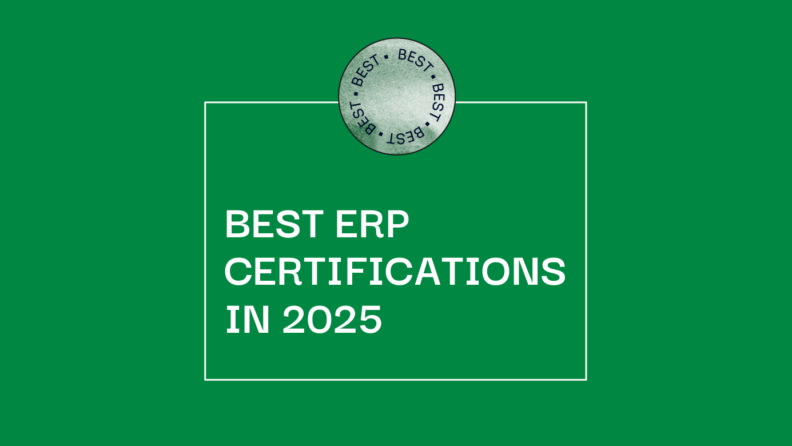If you’re working with ERP systems, getting certified isn’t just a resume boost—it’s a game-changer. The right ERP certifications help you streamline operations, improve reporting, and make smarter financial decisions. But with so many options, figuring out which one is worth your time can be tricky.
As a financial controller, I’ve seen how the right ERP knowledge can turn a clunky system into a powerful tool. Certifications aren’t just about credentials—they give you the skills to maximize your ERP investment and avoid costly inefficiencies.
This guide breaks down the best ERP certifications to help you pick the one that fits your goals. Whether you’re leveling up your own expertise or training your team, you’ll get a clear roadmap to making the most of your ERP system.
Best ERP Certifications Shortlist
- SAP ERP Essential Training — Best for gaining foundational knowledge in SAP ERP systems
- Managing Enterprise Resource Planning (ERP) Implementation — Best for understanding ERP implementation strategies
- Program Certificate in Enterprise Resource Planning (ERP) Online — Best for comprehensive ERP education
- Understanding ERP (Enterprise Resource Planning) Systems — Best for simplifying business processes with ERP
- Microsoft Certified: Dynamics 365 Fundamentals (ERP) — Best for Microsoft Dynamics 365 ERP fundamentals
- Enterprise Resource Planning (SAP) Certificate — Best for SAP ERP expertise
- Enterprise Resource Planning and Management — Best for mastering ERP management
- NetSuite Certification: ERP Consultant Certification Exam Preparation — Best for preparing for the NetSuite ERP Consultant exam
- Enterprise Resource Planning (ERP) — Best for introductory ERP knowledge
- Enterprise Resource Planning (ERP) Training Certification Course — Best for practical ERP training
Overview of the Best ERP Certifications
Below are my detailed summaries of the best ERP certifications that made it onto my shortlist. Each of these in-depth overviews discusses the course teachings, their current pricing, and who each program could benefit.
1. SAP ERP Essential Training
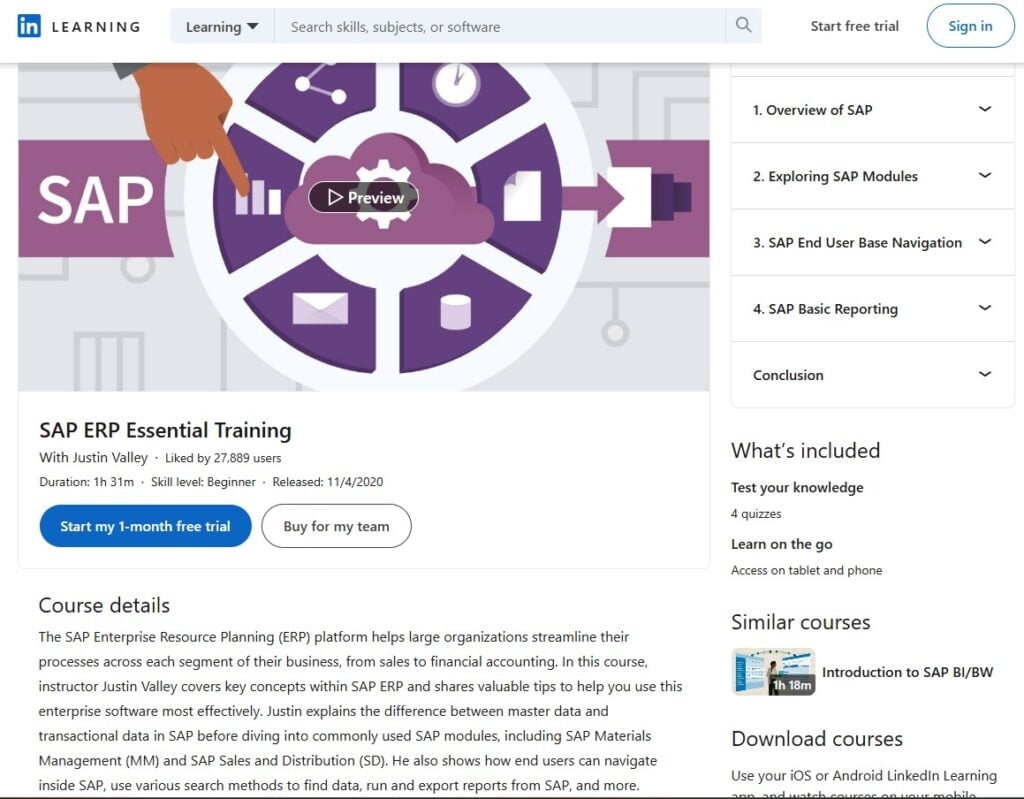
SAP ERP Essential Training is a practical course that helps learners understand how to work within SAP’s enterprise system. It covers the core features and tools needed to manage business processes more efficiently. The training provides hands-on guidance to improve productivity and streamline operations in an organizational setting.
Issued by: LinkedIn Learning
Focus:
- Introduction to SAP ERP
- Navigation and interface
- Core modules such as finance and logistics
- Basic transactions and reporting
Prerequisites:
- Education: Not required
- Work Experience: Not required
- Other Certifications Required: Not required
Renewability: No, it does not expire.
Price: Free
Who It’s For: Individuals seeking a foundational understanding of SAP ERP to effectively contribute to enterprise resource planning processes within their organizations.
2. Managing Enterprise Resource Planning Implementation
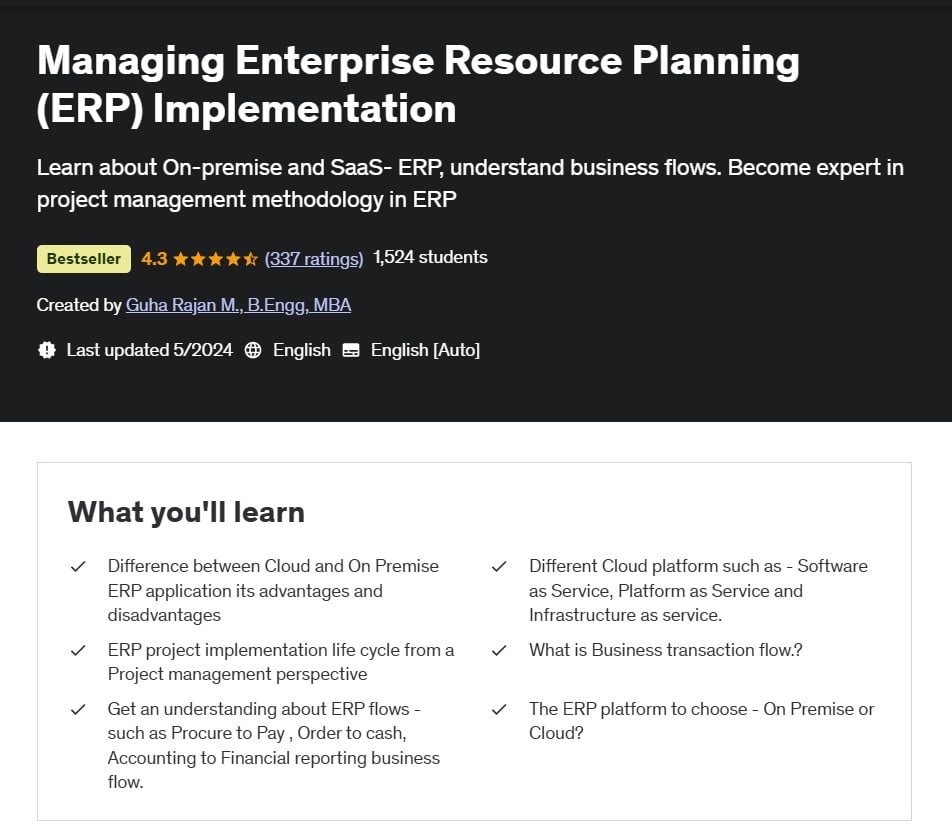
Managing Enterprise Resource Planning Implementation focuses on guiding learners through the complexities of ERP deployment in organizations. The course provides insights into handling implementation projects effectively, ensuring smooth integration of ERP systems into business operations. It equips learners with essential strategies to manage challenges and achieve successful project outcomes.
Issued by: Udemy
Focus:
- Cloud vs. on-premise ERP applications
- SaaS, PaaS, and IaaS platforms
- ERP project lifecycle management
- Business transaction flows
- Choosing the right ERP platform
Prerequisites:
- Education: No formal education requirements
- Work Experience: Not required
- Other Certifications Required: Not required
Renewability: No, it does not expire.
Price: $34.99
Who It’s For: Management or engineering students, IT consultants, project managers, solution architects, and anyone seeking to understand and manage ERP project implementation.
3. Program Certificate in Enterprise Resource Planning (ERP) Online
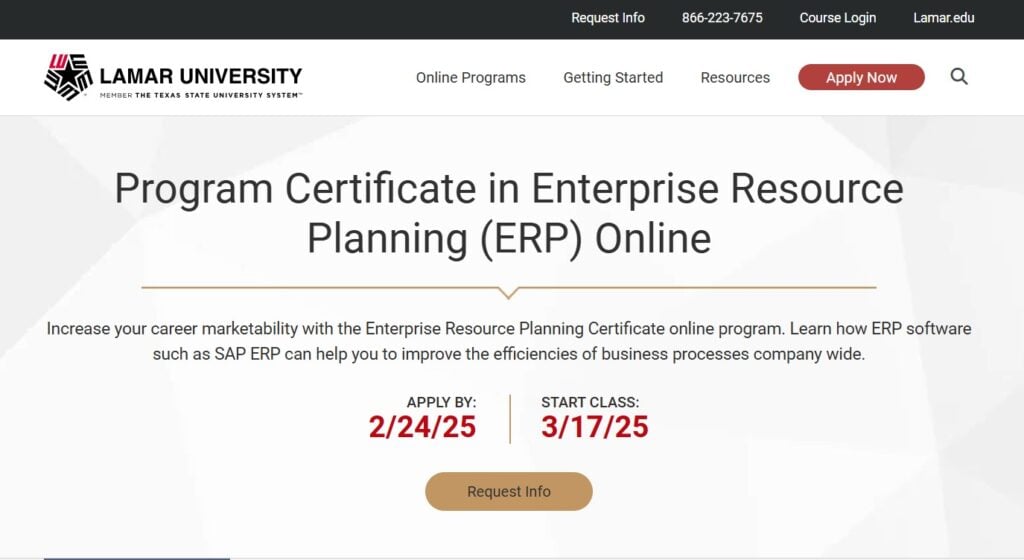
This certification provides students with a solid foundation in enterprise resource planning through hands-on training in ERP systems. Participants will gain practical skills using SAP software to manage core business functions across various departments. Upon completion, students can pursue additional SAP certifications to advance their expertise and career prospects in ERP roles.
Issued by: Lamar University
Focus:
- Marketing
- Supply chain management
- Customer relationship management
- Accounting
- Human resources
- ERP overview
Prerequisites:
- Education: Bachelor's degree with a 2.5 GPA from an accredited institution
- Work Experience: Not required
- Other Certifications Required: Not required
Renewability: No, it does not expire.
Price: $5,268
Who It’s For: Students seeking to advance their careers in roles such as SAP Analyst, ERP Analyst, or Project Manager, by mastering ERP systems and processes.
4. Understanding ERP (Enterprise Resource Planning) Systems
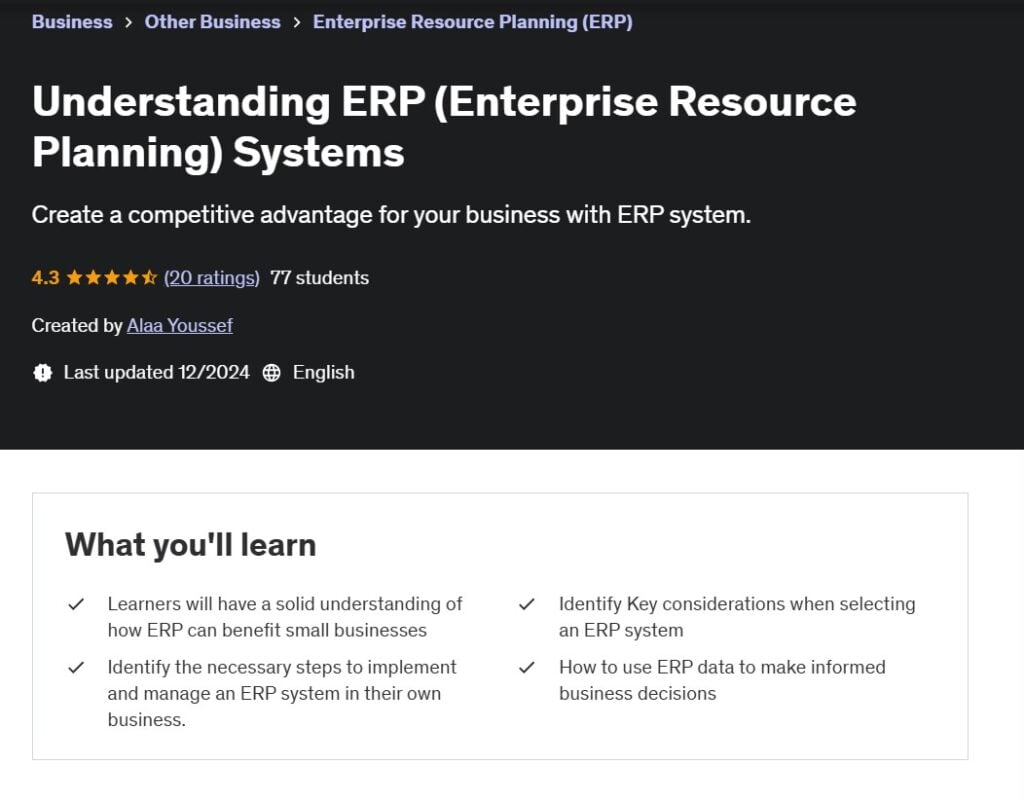
This certification provides a comprehensive exploration of ERP systems and their role in streamlining business processes. It focuses on key components that help unify operations across various departments, enhancing efficiency and data management. Participants gain valuable insights into managing ERP implementation and optimizing system performance for long-term success.
Issued by: Udemy
Focus:
- ERP systems overview and evolution
- System architecture and deployment types
- Core functionalities (finance, supply chain, HR, CRM)
- Implementation and change management
- Best practices for ERP optimization
Prerequisites:
- Education: No formal education requirements
- Work Experience: Not required
- Exam: Not required
- Other Certifications Required: Not required
Renewability: No, it does not expire.
Price: $16.75
Who It’s For: Small business owners and individuals seeking to enhance their operational efficiency by understanding the functionality, implementation, and management of ERP systems.
5. Microsoft Certified: Dynamics 365 Fundamentals
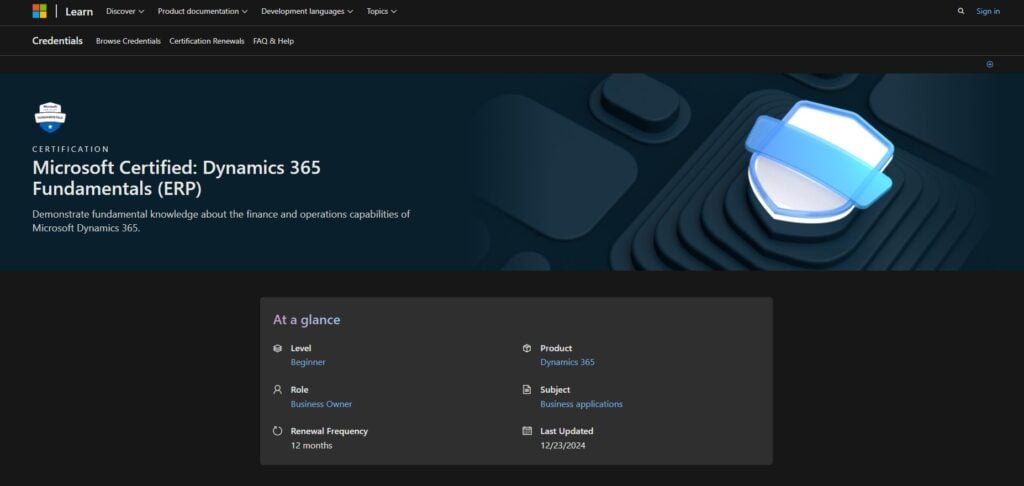
This certification focuses on the essential capabilities of Dynamics 365 Finance and Supply Chain Management applications. It emphasizes features that enhance financial operations, optimize business workflows, and support integrated enterprise management. Please be aware that this is an exam-only certification, and completing relevant courses may be required beforehand to achieve certification.
Issued by: Microsoft
Focus:
- Dynamics 365 finance features
- Supply chain management within Dynamics 365
- Foundational ERP concepts
Prerequisites:
- Education: No formal education requirements
- Work Experience: Not required
- Exam: Passing the Microsoft certification exam
- Other Certifications Required: Not required
Renewability: Yes, every 12 months.
Price: $99
Who It’s For: Individuals starting their journey with Finance and Supply Chain Management solutions, aiming to understand how Dynamics 365 supports financial processes and unifies business operations.
6. Enterprise Resource Planning (SAP) Certificate
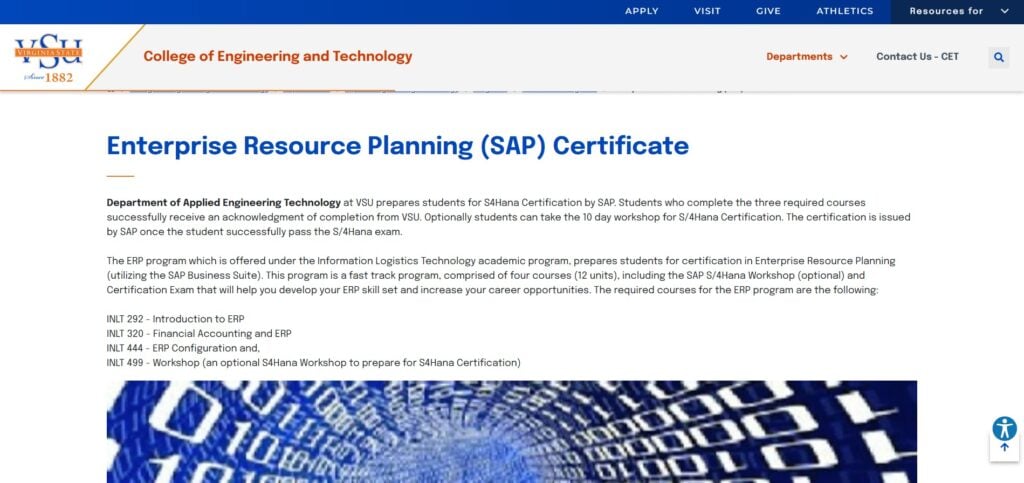
The Enterprise Resource Planning (SAP) Certificate offered by VSU prepares individuals for the SAP S/4 HANA Certification through a structured academic program. Participants complete courses on developing ERP skills, with an optional workshop to enhance their exam readiness.
Issued by: Virginia State University
Focus:
- SAP S/4Hana certification preparation
- Business operations
- Information systems
- Supply chain management
Prerequisites:
- Education: No formal education requirements
- Work Experience: Not required
- Exam: Passing the SAP S/4 HANA exam
- Other Certifications Required: Not required
Renewability: No, it does not expire.
Who It’s For: Individuals aiming to enhance their competitiveness in business operations, information systems, and supply chain management fields by acquiring advanced SAP ERP skills.
7. Enterprise Resource Planning and Management
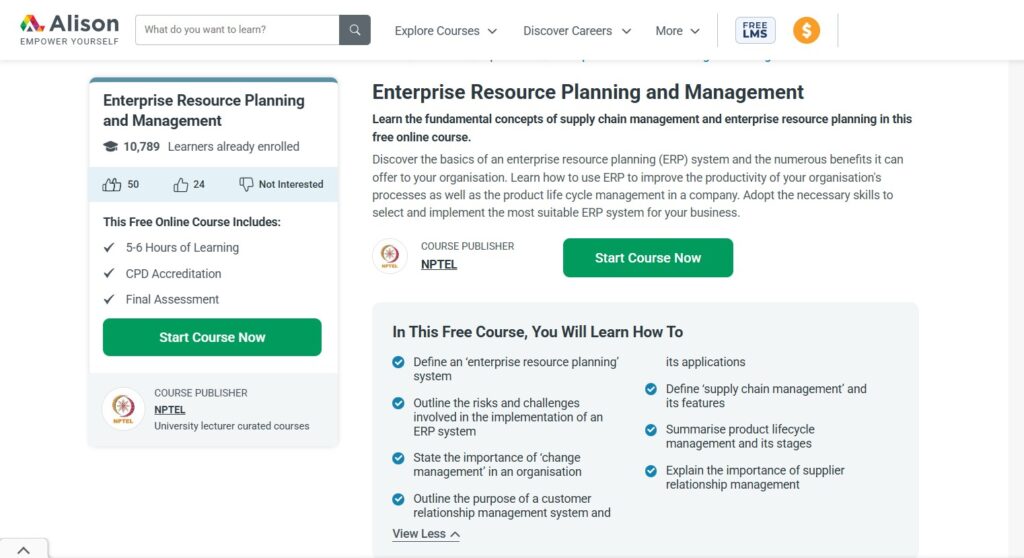
The Enterprise Resource Planning certificate is designed to prepare individuals for SAP S/4 HANA certification by completing a series of targeted courses. The program focuses on building ERP skills through coursework in system configuration, financial processes, and enterprise management.
Issued by: Alison
Focus:
- Supply chain management
- Product lifecycle management
- Risk management
- Change management
- Customer relationship management
Prerequisites:
- Education: No formal education requirements
- Work Experience: Not required
- Exam: Passing the final assessment with an 80% score or higher
- Other Certifications Required: Not required
Renewability: No, it does not expire.
Price:
- Enrollment: Free
- Certificate Options (Optional):
- Digital Certificate: $22
- Printed Certificate: $31
- Framed Certificate: $43
Who It’s For: Individuals seeking to understand and manage ERP systems effectively, showcase their skills to potential employers, and enhance career prospects in ERP management.
8. NetSuite Certification: ERP Consultant Certification Exam Preparation
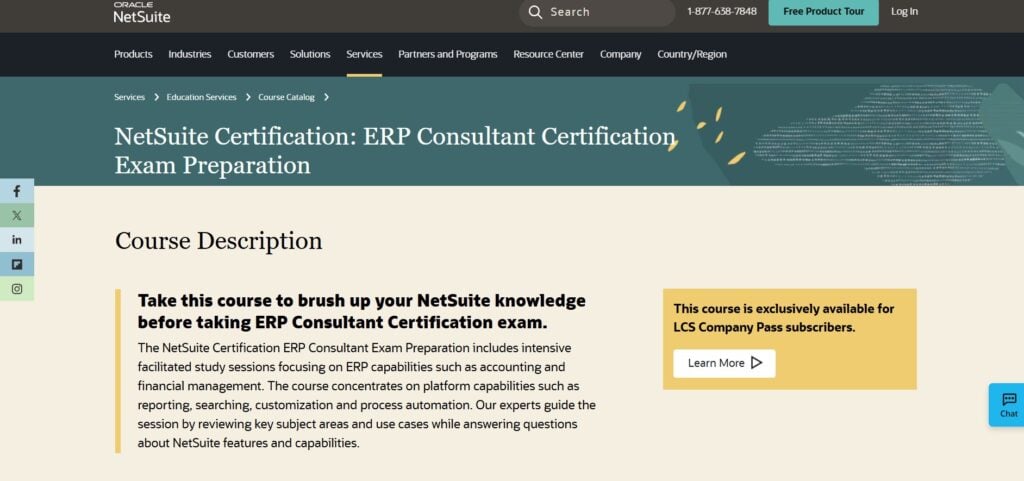
This course helps participants refresh their NetSuite knowledge before attempting the ERP Consultant Certification exam. It covers key ERP functions such as financial management, reporting, customization, and process automation through guided study sessions. Participants will gain practical insights into the platform’s features and use case scenarios to better prepare for the certification exam.
Issued by: Oracle Netsuite
Focus:
- NetSuite ERP platform capabilities
- Financial management and accounting
- Reporting and searching features
- Customization and process automation
- Use case analysis and implementation readiness
Prerequisites:
- Education: No formal education requirements
- Work Experience:
- At least 2 years of experience in a consultant-related role
- Completion of 5-10 medium-scale NetSuite ERP implementations or 2-3 enterprise-level implementations
- Exam: Passing the NetSuite exam
- Other Certifications Required: Completion of NetSuite recommended training courses to ensure adequate product knowledge
Renewability: No, it does not expire.
Who It’s For: Consultants, business analysts, and project team members with experience in NetSuite ERP implementations, seeking to validate their expertise and prepare for the ERP Consultant Certification Exam.
9. Enterprise Resource Planning (ERP)
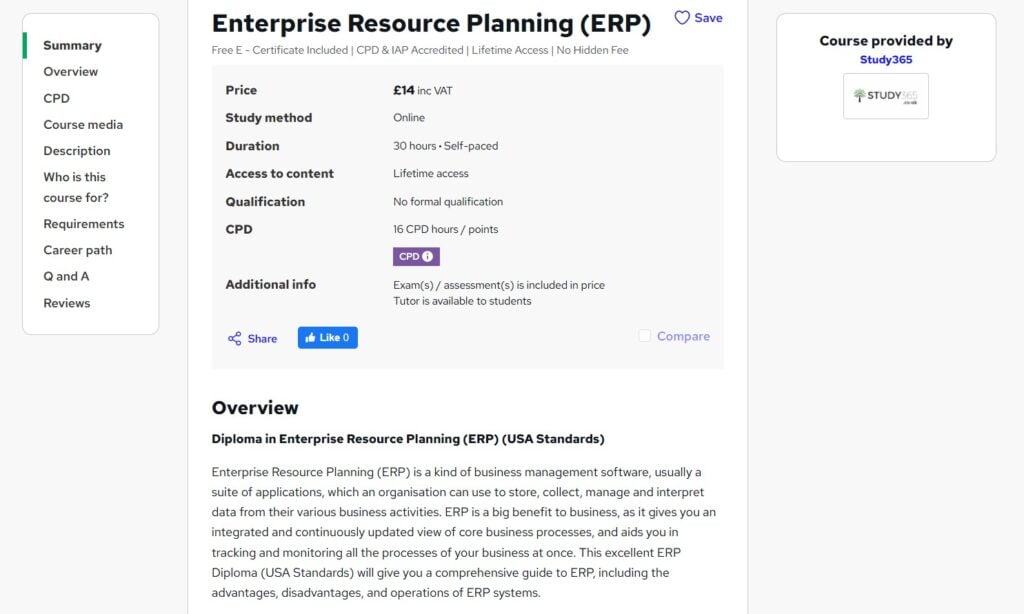
The NetSuite Certification: ERP Consultant Exam Preparation course is designed to help participants review key ERP functionalities before taking the certification exam. It includes guided study sessions that cover NetSuite’s platform capabilities, such as reporting, customization, and automation. This certification aims to strengthen the understanding of essential tools and features to improve exam readiness and performance.
Issued by: Reed Courses
Focus:
- Advantages of ERP systems
- ERP operations
- Implementation strategies
- Risk analysis associated with ERP
- ERP and corporate governance
- Shared services in ERP
Prerequisites:
- Education: Not required
- Work Experience: Not required
- Exam: Yes
- Other Certifications Required: Not required
Renewability: No, it does not expire.
Price: £14 (inclusive of VAT)
Who It’s For: Individuals seeking to gain a foundational understanding of ERP systems, making it suitable for school leavers, job seekers, and entrepreneurs. It prepares participants for roles such as ERP Systems Administrator, Developer, and Project Manager.
10. Enterprise Resource Planning (ERP) Training Certification Course
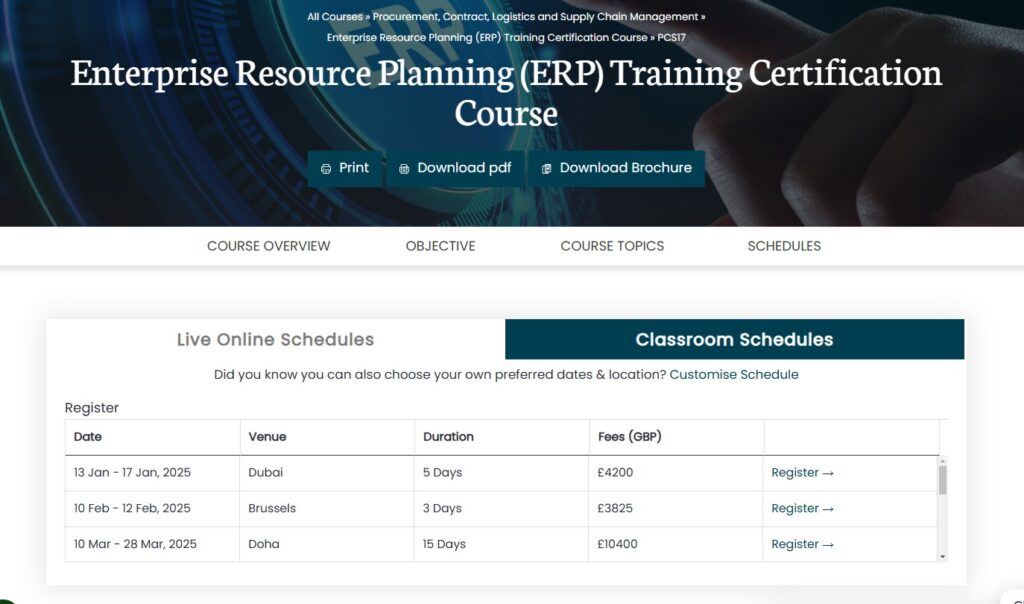
The Enterprise Resource Planning (ERP) Training Certification Course provides participants with essential skills to effectively manage ERP systems and automate business workflows. It emphasizes the seamless integration of core operations to improve productivity and reduce operational complexities. This certification prepares learners to optimize ERP solutions and drive more efficient management across various departments within an organization.
Issued by: Rcademy
Focus:
- Introduction to ERP
- Procure to pay business flow
- Procure-to-pay flowchart
- Business process mapping
- Phases of ERP implementation plan
Prerequisites:
- Education: Not required
- Work Experience: Not required
- Exam: Not required
- Other Certifications Required: Not required
Renewability: No, it does not expire.
Price:
- Live Online: £2,370–£10,410 (varies by date)
- Classroom: £4,590–£12,480 (varies by date and location)
Who It’s For: IT consultants, project managers, enterprise solution architects, and finance professionals aiming to enhance their ERP management capabilities and improve organizational efficiency.
FAQs about ERP Certifications
Here are some frequently asked questions about ERP certifications:
What is ERP Certification?
An ERP Certification is a credential that demonstrates an individual's proficiency and expertise in Enterprise Resource Planning (ERP) systems. These certifications are often offered by ERP vendors or independent organizations and serve as a validation of skills in implementing, using, and managing ERP software effectively.
Why is ERP Certification important?
ERP Certification is important because it enhances a professional's credibility and marketability in the job market. It signifies that the individual possesses the necessary knowledge and skills to handle complex ERP systems, which are critical for streamlining business processes and improving organizational efficiency.
How can one obtain ERP Certification?
To obtain ERP Certification, candidates typically need to complete a series of training courses followed by an examination. The specifics can vary depending on the certifying body and the ERP system in question. Providers like SAP, Oracle, and Microsoft have their own certification programs (like the SAP certification or Excel certification) that cater to their specific ERP platforms.
What are the prerequisites for ERP Certification?
Prerequisites for ERP Certification can vary widely depending on the specific certification and the issuing body. Some certifications may require prior experience with ERP systems, while others might necessitate the completion of certain training modules or courses. It's essential to review the specific requirements of the certification program you are interested in.
How does ERP Certification benefit employers?
ERP Certification benefits employers by ensuring that their staff is well-versed in using ERP systems and information technology. This can then lead to improved efficiency and productivity in business operations, as well as increased revenue operations. Overall, certified professionals are often better equipped to leverage the full capabilities of ERP software to optimize business processes, leading to potential cost savings and enhanced competitiveness in the market.
Other Useful Resources
Looking for more inspiration? Here are a few other useful ERP resources to check out:
- 6 most common ERP components
- Guide to ERP reporting
- 5 common ERP implementation methodologies
What's Next?
Ready to compound your abilities as a finance professional? Subscribe to our free newsletter for expert advice, guides, and insights from finance leaders shaping the tech industry.

